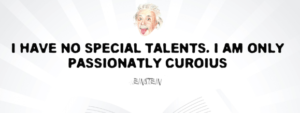WHAT inspires a chef to create a new recipe? What inspires a child to learn? What impels an explorer to venture to faraway places? What makes a child ask so many questions? More often than not, it is your curiosity skill.
Employ your curiosity skill.Are you struggling to get your messages heard by your customers? After all, there are tons of competition and many, too many messages for your customers.
Have you tried creating some mystery or curiosity to gain attention?
If you want to stimulate your customers’ curiosity, as a marketing technique, make them aware of something they don’t know.
Find the information you can use to raise questions about their perceptions. Chances are, you’re either withholding all the specifics or presenting it all.
Your curiosity skill … a motivating example
Curiosity, of course, has its positive side. Consider the case of Alexander von Humboldt, the 19th-century German naturalist, and explorer after whom the Humboldt Current, off the west coast of South America, was named.
At one point in his life, Humboldt said: “From my earliest youth I had felt an ardent desire to travel into distant regions, which Europeans had seldom visited.”
This desire arose, he said, when he felt “an irresistible attraction in the impetuous agitations of the mind.”
At the age of 29, he traveled to Central and South America on an expedition that lasted five years. With the information that he collected, he compiled a 30-volume chronicle of his travels.
Everything attracted Humboldt’s attention —the temperature of the ocean, the fish that lived in it, the plants he found in his path. He climbed mountains, explored rivers, and sailed the oceans.
Humboldt’s research laid the foundation in several fields of modern science.
It all began with his intense curiosity, and his insatiable desire for knowledge accompanied him throughout his life.
In the words of American essayist Ralph Waldo Emerson, “Humboldt was one of those wonders . . . who appear from time to time, as if to show us the possibilities of the human mind, the force and the range of the faculties.”
Would you like to improve your curiosity? Here are some interesting ways you can:
Get contextual
One habit that we can cultivate is to always get contextual first. All problems are problems in a specific context and the same thing can be a desirable thing in a different context.
So, it is extremely important to understand the context in which we are observing the situation or the problem.
We then look at the same problem with different context. In the case of potato chips, we can look at the situation from the view of the chef, the customer, the inventor of packaging, restaurant owner, etc.
Understanding the context then gives us the ability to find out if and how our solutions will work in similar contexts. What will happen if the context changes?
Will our solutions still be relevant or needed in that situation. Is there a way that we can flip the context so that there is no need to solve the problem, as it no longer remains a problem?
Your curiosity skill … steal like an artist
One of the things that we all know is that there are very few things in the world that are completely new.
Everything else is either copied from elsewhere or inspired from something or a combination of different ideas coming together. What this means is that in order to come up with creative output, we need creative input.
This means that we need to constantly look out for inspiration all around us. Inspiration is the fuel which keeps our curiosity going.
Seek inspiration out by looking beyond obviously related contexts, fields, and networks, industries.
Here is a suggestion. Make a notebook where you collect interesting, weird and inspiring stories, actions, art or whatever. Share this with all your teammates.
Go back to this notebook every time you feel stuck with something.
Read widely following your interests
John Lloyd was a hugely successful TV producer and director until one day he started to encounter a string of failures. This led him to depression.
He dealt with it by taking time off work, going on long walks, and reading voraciously. He read about “Socrates and ancient Athens. He read about light and magnetism.
He read about the Renaissance and the French impressionists. He had no method or plan, but simply followed his curiosity, wherever it took him.” All this reading eventually led to his idea for the BBC quiz show QI, which is loved by millions for its “ability to make anything—from quantum physics to Aztec architecture—entertaining.”
Here is the takeaway lesson. B. F. Skinner said, “When you run into something interesting, drop everything else and study it.”
“The feeling of being interested can act as a kind of neurological signal, directing us to fruitful areas of inquiry.”
Visit a physical bookstore or library and browse shelves
In the era of Google searches, we have no problem finding the exact answer to our question, but we may be less likely to serendipitously encounter information that is not specific to our question.
Visiting a bookstore or a library allows us to encounter other information in a way that is not dictated by the structure of the algorithm. “A serendipity deficit makes innovation harder because innovation relies on unexpected collisions of knowledge and ideas.”
Curiosity is also about discrimination. It is about which knowledge we want to explore.
Take away lesson: Get out from behind your computer and explore.
https://digitalsparkmarketing.com/visual-content-tools/
Insert many ideas and facts in your head
Sir Ken Robinson’s TED video “Do Schools Kill Creativity?” has been viewed over 4 million times. But Leslie argues that “Robinson has it precisely the wrong way around when he says that a natural appetite for learning begins to dissipate once children start to be educated.”
“Progressive educationalists like Robinson frame existing knowledge as the enemy of new ideas. But at the most basic level, all of our new ideas are made up of old ones…to create a smartphone, you need to know about computers and phones.”
“We romanticize the curiosity of children because we love their innocence. But creativity doesn’t happen in a void. Successful innovators and artists amass vast stores of knowledge which they can then draw on unthinkingly.
Having mastered the rules of their domain, they can concentrate on rewriting them. They mix and remix ideas and themes, making new analogies and spotting unusual patterns, until a creative breakthrough is achieved.”
Here are more ways that curiosity enhances our well-being and the quality of our lives:

Intelligence
Studies have shown that curiosity positively correlates with intelligence. In one study published in the Journal of Personality and Social Psychology in 2002, researchers correctly predicted that high novelty-seeking (or highly curious) toddlers would have higher IQs as older children than toddlers with lower levels of curiosity.
Researchers measured the degree of novelty-seeking behavior in 1,795 3-year-olds and then measured their cognitive ability at age 11.
As predicted, the 11-year-olds who had been highly curious 3-year-olds later scored 12 points higher on total IQ compared with low stimulation seekers. They also had superior scholastic and reading ability.
Other studies have shown that high levels of curiosity in adults are connected to greater analytic ability, problem-solving skills, and overall intelligence. All of which suggests that cultivating more curiosity in your daily life is likely to make you smarter.
Social relationships
Curious people are inclined to act in ways that allow relationships to develop more easily. In one of my studies, participants spent five minutes getting acquainted with a stranger of the opposite sex, and each person made judgments about his or her partner’s personality.
We also interviewed their closest friends and parents to gain added insight into the qualities that curious people bring to relationships.
Each of these groups — acquaintances of a mere five minutes, close friends and parents — characterized curious people as highly enthusiastic and energetic, talkative, interesting in what they say and do, displaying a wide range of interests, confident, humorous, less likely to express insecurities, and lacking in timidity and anxiety compared with less curious people.
Curious people ask questions and take an interest in learning about partners, and they intentionally try to keep interactions interesting and managing playful.
This approach supports the development of good relationships.
Reconnect with play
We can add play and playfulness to almost any task, and the attitude of play naturally builds interest and curiosity.
This dynamic was captured wonderfully in a National Public Radio story about an assembly-line worker in a potato chip factory whose job was to make sure that the chips rolling down the conveyor belt were uniform and aesthetically pleasing before being bagged.

This man found the job dreary. So he developed a game that made it more interesting: He searched for potato chips resembling famous people and kept a collection (imagine silhouettes of Elvis, Charles Manson, Marilyn Monroe, and Jimi Hendrix).
Because he was constantly scanning odd and bizarre shapes for celebrity resemblances, the day moved quickly. He also became incredibly efficient at catching misshapen chips.
Explore your passions
Be curious about yourself. What are your values and motivations? What makes you tick?
Are there activities that make you feel fully engaged in life that you haven’t revisited since you were younger? What are they? Do one of them.
The bottom line
I am sure that by spending a lot more time in the problem space, using your curiosity, there is a much better probability that you will identify the right problem.
There is a better chance that you might even eliminate the problem without even having to try to solve it.
Don’t just try and keep pace with your competitors. Always use your curiosity to your advantage by striving to leapfrog them.
Use your curiosity to not define the best practices but the next best practices.

Need some help in improving the creativity of you and your staff? Creative ideas to help the differentiation with your toughest competitors?
Call today for a FREE consultation or a FREE quote for a workshop on creativity. Learn about some options for creativity workshops to get noticeable results.
Call Mike at 607-725-8240.
All you get is what you bring to the fight. And that fight gets better every day you learn and apply new creative ideas.
When things are not what you want them to be, what’s most important is your next step. Call today.
Try. Learn. Improve. Repeat.
Are you devoting enough energy improving your creativity, innovation, and ideas?
Do you have a lesson about making your creativity better you can share with this community? Have any questions or comments to add in the section below?
Like this short blog? Follow Digital Spark Marketing on LinkedIn or add us to your circles for 3-4 short, interesting blogs, stories per week.
Mike Schoultz is the founder of Digital Spark Marketing, a digital marketing and customer service agency. With 40 years of business experience, he writes about topics to help improve the performance of small business. Find him on G+, Facebook, Twitter, and LinkedIn.
Digital Spark Marketing will stretch your thinking and your ability to adapt to change. We also provide some fun and inspiration along the way. Call us for a free quote today. You will be amazed at how reasonable we will be.
More reading on creativity from Digital Spark Marketing’s Library:
10 Different Ways to Enhance Creativity
Secrets to Understanding the Genie in the Creativity Bottle
How You Are Destroying your Creativity and Imagination
13 Motivators for Creating a Change and Adaptability Culture
“